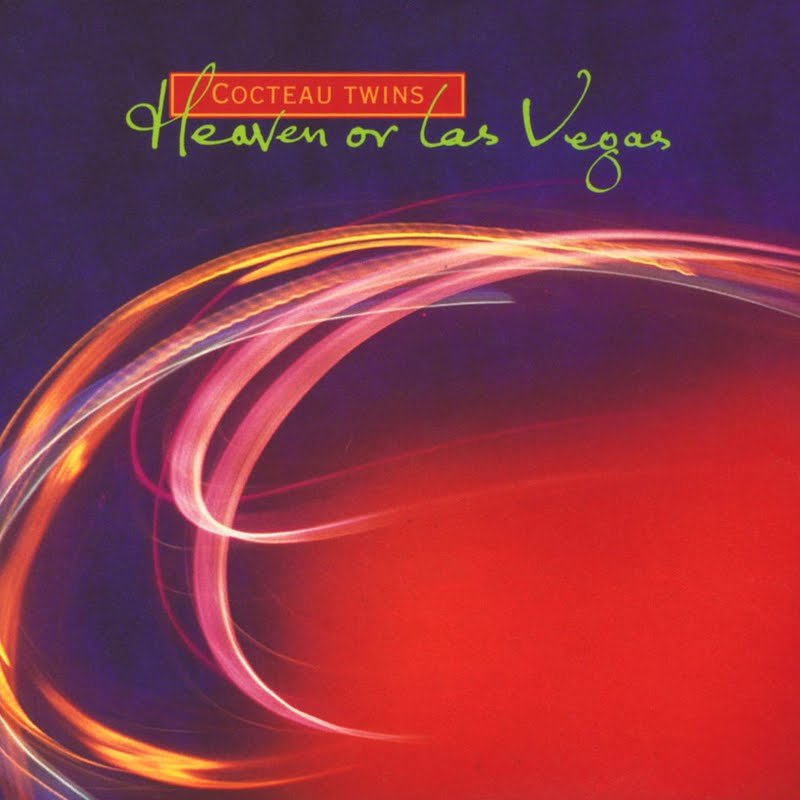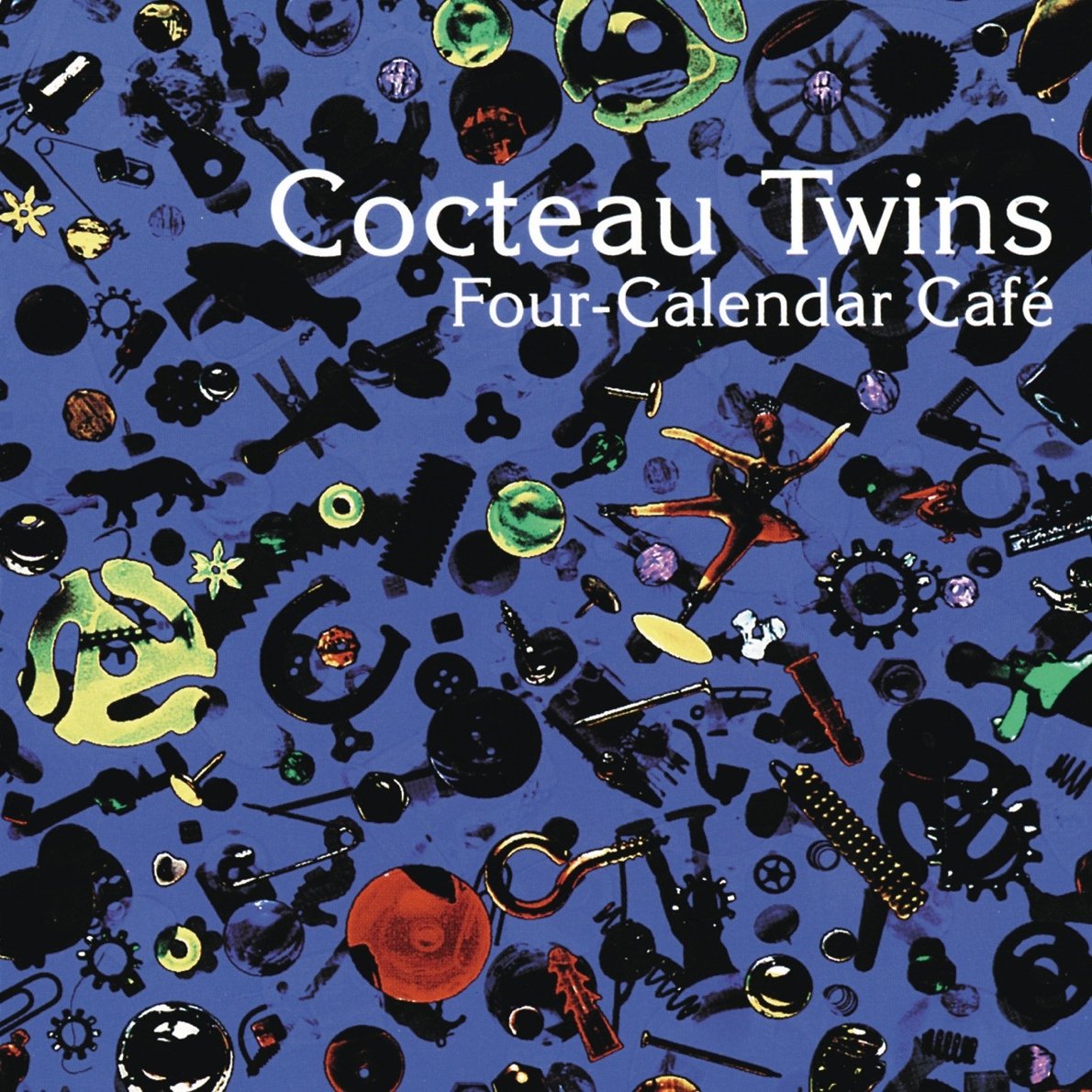Happy 25th Anniversary to Cocteau Twins’ eighth and final studio album Milk & Kisses, originally released in the UK March 13, 1996.
At the risk of stating the blatantly obvious, few bands have achieved as much crystalline beauty through sound as the enigmatic Cocteau Twins did during their eighteen-year career. Across their eight studio albums, and nearly two dozen EPs and compilations, the Scottish trio of Elizabeth Fraser, Robin Guthrie, and Simon Raymonde proved masters of daydream-conjuring, goosebump-inducing songs that lodge themselves in your heart, mind, and soul for a lifetime. Indeed, their exalted, uniquely addictive brand of ethereal dream-pop produced some of the most spellbinding compositions heard during the 20th century’s final two decades.
The enduring permanence of Cocteau Twins’ music—a remarkable phenomenon considering that the group disbanded nearly twenty-five years ago—has much to do with the rarefied treasure that is Fraser’s voice, a stunning, operatic instrument that defies all comparison. An acquired taste for some, an unequivocal blessing for others, Fraser’s unorthodox approach to lyricism embraces a fluid hybrid between discernible English and indecipherable Glossolalia, the convergence of which has made for some of the most stirring vocal displays ever committed to wax. Though while Fraser’s voice was always front and center, her two comrades Guthrie and Raymonde, the duo responsible for the band’s lush, atmospheric wall of shimmering sound, played an equally influential role in the band’s success and indelible legacy.
Quite remarkably, in light of how obsessively their fans worship them, then and now, the staunchly introspective band managed to preserve their modesty through it all and never fully embraced their widespread popularity. While many bands allow their egos free reign, oftentimes with detrimental consequences, Cocteau Twins’ humility enabled them to avoid complacency in their songcraft, while sustaining enough self-awareness to recognize and dismiss the irrational expectations that their most sycophantic followers placed on them.
“I suppose [the acclaim] is really flattering but I try not to think about it a great deal,” Raymonde explained in a 1996 interview with Music Monitor. “I've got more important things to think about. I mean, I'd like to improve what we do. At the same time, I can hear what we do in other people's music. But a band like Blur, or something, you don't expect them to be groundbreaking, you just expect them to be a laugh and their music to be quite fun. But some people expect the Cocteau Twins to be doing such great things all the time, and moving on. It's like, 'Oh, Liz has sung in this phonetic language and now we've heard her singing in real words, how come she's not singing six octaves above human hearing and only available to canines?' Sometimes I feel like people want so much. Perhaps it's my own insecurities, I can't say for sure.”
Perhaps ironically, the threesome’s reluctance to bask in the limelight has only added to their mystique and their fans’ unbridled devotion over the years.
Listen to the Album:
Throughout the 1980s, Cocteau Twins continually refined and stretched their experimental sound, garnering critical, if not commercial, acclaim in abundance on the strength of their debut studio LP Garlands (1982), followed in succession by Head Over Heels (1983), Treasure (1984), Victorialand (1986), and Blue Bell Knoll (1988), all released via the iconic 4AD label. The 1990s were a markedly more transformative period for the band, defined by extreme highs and painful lows, the inevitable vicissitudes of being in one of the world’s most passionately beloved bands comprised of three relentless perfectionists.
The trio’s 1990 album Heaven or Las Vegas, considered their magnum opus by many, proved their most commercially viable recording to date, as its sales finally matched their long-garnered critical kudos. After Heaven’s success, however, they left 4AD due to conflicts with the company’s top brass and nearly broke up due to internal turmoil, at least partly precipitated by Guthrie’s intensifying drug and alcohol problems. Nevertheless, they persevered and in March of 1992, signed a new deal with Fontana Records in the UK, while remaining under contract with Capitol Records in the US.
Later the following year, the group’s seventh studio LP, Four-Calendar Café, was released, its more straightforward pop arrangements and Fraser’s substantially more coherent vocals signaling the band’s newfound creative freedom and flexibility. In a 1996 VH-1 interview, Raymonde extolled the virtues of the band’s label transition, explaining that, “The irony was that people assumed that we had so much control at 4AD. We have much more now than we ever had. Much more, almost too much.”
For their eighth—and what would prove to be their final—studio album, the band returned to their signature ambient sound awash with multi-layered guitars and Fraser revived her hybrid vocal approach, to glorious effect on both counts. Largely recorded in Brittany, France and released amidst the disintegration of Fraser and Guthrie’s romance and the latter’s recovery from drug and alcohol addiction, Milk & Kisses captures the sound of a resilient band gallantly dedicated to creating sonic splendor of the highest order, when the surrounding noise was anything but idyllic.
"A friend was kind of comforting me on the phone and they were just being so sweet, really," Fraser confided, when asked about the inspiration behind the album title during a 1996 Alternative Press interview. "They had empathy for what I was going through, and they said, 'I wish I could get the poison out of you. I wish I could just take it out of you and replace it with milk and kisses.' And I just thought that was really brilliant! It's beautiful, isn't it? I kept hearing it and feeling so good about it, it seemed right to use it." Evocative of a childlike innocence and reassuring sense of comfort, Milk & Kisses suggested a spiritual counterweight to the very adult conflicts the group was confronted with at the time.
Enjoying this article? Click/tap on the album covers to explore more about Cocteau Twins:
The dazzling album opening dirge “Violaine” ranks among the band’s finest arrangements ever, thanks to its crunchy yet melodic overlapping guitars and hypnotic rhythms. Anyone attempting to mine Fraser’s lyrics for deeper meaning, however, will be disappointed, as the lyrics were primarily comprised of words sung backwards. Further proof that while the group certainly had their thematically poignant moments on record, there are plenty of Cocteau Twins songs that derive substance not from profound narratives or revelations, but rather from their embodiment of pure sonic bliss. The exquisitely crafted “Serpentskirt” is another sublime composition, which begins as a melancholy-tinged lament, but then becomes more euphoric around the 2:20 mark, its vacillations reinforcing the group’s unparalleled penchant for tapping into a varied array of emotions within the span of a four-minute song.
Among the more lyrically intelligible fare is “Tishbite,” a hushed ballad that explores the often blurred lines between the real and imaginary dimensions of love. Listening to the poignant “Half-Gifts,” the listener can’t help but detect the autobiographical undertones reflective of Fraser and Guthrie’s fractured love, as evidenced by her eloquently contemplative lyrics: “But this relationship cannot sustain itself / Intimacy is when we're in the same place at the same time / Dealing honestly with how we feel, and who we really are / That's what grown-ups do / That is mature thinking / I just have to know how to be in the process / Of creating things in a better way / And it hurts but it's a lie that I can't handle it / I still have a world of me-ness to fulfill / I still have a life, and it's a rich one even with mourning / Even with grief and sadness.” While the song is a sobering examination of a relationship in disrepair, it’s also Fraser’s grand declaration of independence, of moving on toward a new life full of hope and purpose.
The ten-song suite contains nary a throwaway track, with other memorable highlights including the rhapsodic “Calfskin Smack,” the cinematic album closer “Seekers Who are Lovers,” and the serene “Rilkean Heart,” a wistful homage to the late Jeff Buckley, who was a kindred spirit of Fraser’s, musically and otherwise, and a lifelong lover of the Bohemian-Austrian poet Rainer Maria Rilke’s writing.
Mutual admirers of each other’s music, Buckley and Fraser developed a creative and spiritual bond in the mid 1990s, which yielded at least one known collaboration, “All Flowers in Time Bend Towards the Sun,” an unofficial version of which has circulated online in recent years, much to Fraser’s chagrin. Their profound connection was further manifested in Milk & Kisses’ liner notes dedication, in which Fraser wrote "Milk and kisses for the first man / my old man / love and a thousandfold rose for Buckley / my Rilkean Hearted friend." Sadly, the pair’s relationship was an ephemeral one, cut short by Buckley’s tragic death in the spring of 1997.
Milk & Kisses proved to be Cocteau Twins’ swan song, as the band’s irreconcilable differences finally drove them to part ways in 1998. "They were my life,” Fraser said of Guthrie and Raymonde during her 2009 conversation with The Guardian. “And when you're in something that deeply, you have to remove yourself completely."
As is the case across their entire discography, with each subsequent listen to Milk & Kisses, previously overlooked nuances and delights emerge, making for an eternally revelatory and soul-affirming listening experience overall. Two-and-a-half decades later, the album still has the power to instantly transport us back to those halcyon days when Cocteau Twins were still making gorgeous music together, as we cling to the futile hope that the trio will reunite one day to resurrect their story for a new generation of dreamers.
LISTEN:
Editor's note: this anniversary tribute was originally published in YEAR and has since been edited for accuracy and timeliness.



